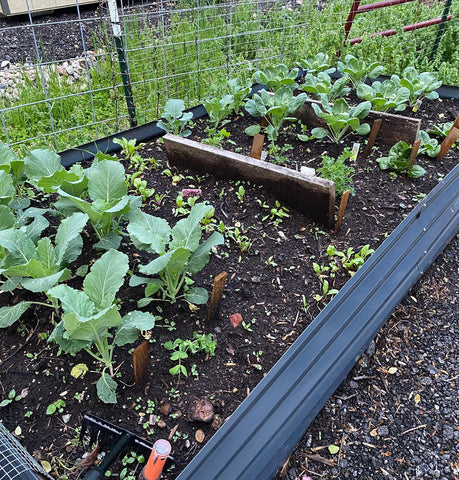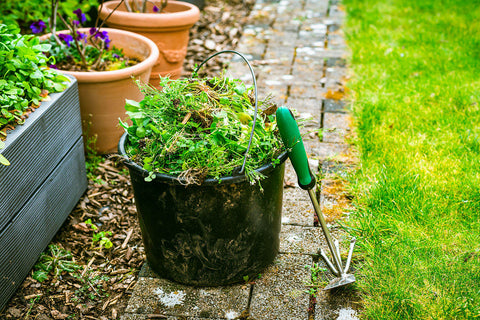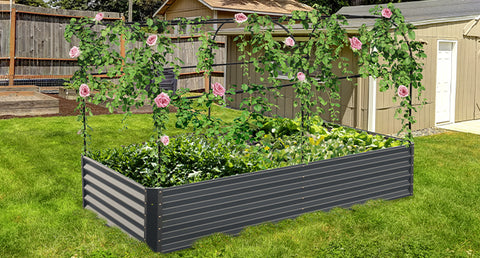One of the biggest challenges for beginners is dealing with pests and diseases. These pests and diseases can destroy your carefully cultivated garden vegetables. Pests are a common problem for gardeners, so you shouldn't be too disappointed if your vegetables are overrun by them.The following content also has some reference value for raised garden beds.
Common pests in vegetable gardens are:
Beetles: A variety of beetles can target your beautiful vegetables. The Colorado potato beetle is a particular problem for gardeners. The Colorado potato beetle is found in vegetable gardens throughout North America. Beetles are particularly harmful to plants such as radishes, tomatoes, eggplants and potatoes.
Flea beetles: Flea beetles are gardeners' bores. These little beetles plague a variety of different vegetables, such as radishes, eggplants and cabbage. These destructive critters will chew up your carefully preserved vegetables.
Knife worms: Knife worms are particularly harmful to young plants. As the name suggests, earthworms cut the roots of vegetables. Usually, they cut through the roots of young vegetables. Knifeworms are about 1 inch long and tend to be dark in color. Frustratingly, knife worms are usually found at night, making them difficult to spot.
Aphids: Aphids are tiny creatures known as liquid-eating insects. They tend to target a variety of different plants, including fruits and vegetables. When aphids suck SAP from plants, they deform them. Not to mention, the substances they secrete can harm other creatures, including ants. Therefore, it is important to keep these pear-shaped critters away from your delicious vegetables.
Snails and slugs: Snails and slugs are probably the most common garden pests. Snails and slugs are frustrating because they can quickly destroy an entire garden. They eat not only vegetables, but also a variety of other plants.
Carrot Rust flies: As you might have guessed, these flies love carrots. However, they also lay their eggs around a variety of other vegetables, such as celery and parsnips. Specifically, these flies leave their larvae in the roots of these plants. Unfortunately, this can do quite a bit of damage to the carrots.
Fortunately, there are several different ways to deal with pests. It's important to know how to deal with these pests because you can take precautions to stop them from damaging plants. Here are some of the best ways to deal with these pests:
Consider growing pest-resistant plants: Certain vegetables and plants are known to have natural pest-resistant abilities. Onions, leeks, and garlic all work well against these common pests. This is a good option for those who don't want to deal with these pests. Of course, this can severely limit the variety of plants you can grow in your garden.
Encourage useful insects: Not all insects will be harmful to your precious vegetables. In fact, some insects are very beneficial. Insects such as ladybugs will fend off bugs that eat your plants by eating pests. Essentially, these beneficial insects can be attracted to pollen and other protein-rich insects.
Use barriers: Physical barriers are probably the most effective way to deal with garden pests. For example, you can cover any pest-prone plants with physical barriers, such as lightweight netting. Floating row covers are also an extraordinary way to ward off pests.
Location: Choosing the perfect location is the key to gardening. That's because location affects how much sunlight, shade, and moisture a plant receives - three factors that affect vegetable growth. Choosing the right location will ensure that the plant is strong, which means it will be better able to survive pest infestations.
Intercropping: Intercropping is a gardening method used by many experienced gardeners. Essentially, the practice involves growing at least two plants in close proximity. This will drive away pests, which will struggle to find host plants. Therefore, this will reduce the risk of plant loss.
In the meantime, the disease will take a different form. You can determine if your vegetables have disease because they can rot, rust, mold, scab, and spot.
To ward off these diseases, you should take precautions. Ideally, you should take steps to ensure that vegetables are as healthy as possible. Here are some of the best ways to protect your vegetables from disease:
Mulch: Mulch is a great addition to any garden. Mulch is applied to garden surfaces to give the soil more moisture and prevent weeds. Some forms of mulch have also been found to prevent the spread of garden diseases.
Fungicides: As the name suggests, fungicides are chemicals used to kill fungi or limit their growth. There are many natural fungicides that can be used to keep vegetables safe, including solutions made from baking soda.
Destroy infected plants: If your plants are already affected by a disease, you may need to destroy them to prevent the disease from spreading further. While it can be disappointing to ruin a vegetable you've worked so hard to grow, sometimes it's necessary to stop the risk of infection. Never compost these damaged plants.
Avoid planting disease-prone plants: Some plants are more susceptible to disease than others. For beginners, it is best to avoid these plants as they may cause more problems than they are worth.









